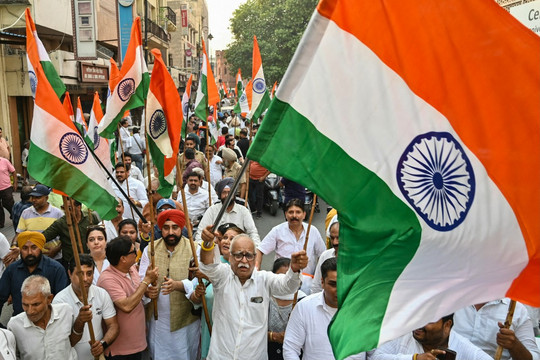Press Statement
India: Arrests surge over ‘anti-India’ social media posts
01 Jul, 2025India’s northeastern state of Assam has emerged as a focal point of the crackdown which came in the wake of the April terror attack on April 22 in Pahalgam, Jammu and Kashmir. Assam’s Chief Minister, Himanta Biswa Sarma, confirmed the arrest of at least 94 people in the state, including the general secretary of the opposition All India United Democratic Front party, Aminul Islam. The leader was initially charged on April 24 for sedition for allegedly defending Pakistan’s complicity in the Pahalgam attack and was later re-arrested on May 14 under the country’s controversial National Security Act (NSA).
The Assam chief minister, a leader from the ruling Hindu nationalist Bharatiya Janata Party (BJP), vowed a “state-wide crackdown on traitors would continue”. Assam authorities are alleged to be actively monitoring digital platforms for content deemed as sympathetic to Pakistan, though in one case Assam police allegedly arrested a man for posting a Pakistan flag on Instagram.
In Uttar Pradesh state, police have now arrested at least 30 individuals across 18 districts allegedly opposed India’s Operation Sindoor, the country’s retaliatory military operation against Pakistan. The state’s police are also reportedly pursuing people who deleted social media posts or accounts after making ‘anti-national’ comments.
Other high-profile arrests include Ali Khan Mahmudabad, a professor at Ashoka University, who was detained by Haryana police in New Delhi on May 18, allegedly over a Facebook post criticising the glorification of India’s military response and noting rising domestic hate crimes. He faces charges related to communal disharmony and incitement of armed rebellion.
Human Rights Watch (HRW) and other civil rights groups have expressed strong concerns that the arrests are part of a broader effort by the Indian government to stifle dissent and target Muslim voices. A recent Bombay High Court decision that granted bail to a 19-year-old Muslim student accused of sedition, warned that state overreach risked “further radicalising” India’s young people.
State police crackdowns on individual journalists have followed on from the Central Government’s move to block news outlets for media coverage of the Kashmir attack. On April 29, YouTube channel 4PM News Network, with a 7.3 million subscriber base, was blocked under Section 69A of the 2000 Information Technology Act for allegedly posting videos critical of India’s response to the attack.
The website of independent news outlet The Wire was blocked in May, along with 8,000 X (formerly Twitter) accounts, including Kashmir-based news outlets Free Press Kashmir, Kashmiriyat, and Maktoob Media. The Wire condemned the move as “arbitrary” and a violation of press freedom. Authorities also blocked at least 16 Pakistani YouTube channels, including prominent media outlets Dawn News, Samaa TV, ARY News, and Geo News, accusing the outlets of spreading misinformation and threatening the country’s national security.
The IJU said: “While national security is paramount, the indiscriminate labelling of dissenting voices as ‘anti-India’ and the subsequent arrests for mere social media posts are deeply troubling. Freedom of expression is a cornerstone of democracy, and curbing it under the guise of nationalism risks stifling legitimate discourse. We urge the authorities to exercise restraint and ensure that actions against individuals are based on clear evidence of wrongdoing, not subjective interpretations of patriotism.”
The IFJ said: “The IFJ condemns the use of sedition and preventative detention laws to arrest individuals for exercising their right to expression on important national issues and calls on the Indian authorities to respect the principles of democracy and to ensure the right of the media to report in the public interest.”
Written By
 IFJ Asia-Pacific
IFJ Asia-Pacific
The IFJ represents more than 600,000 journalists in 140 countries.
For further information contact IFJ Asia-Pacific on +61 2 9333 0946
Find the IFJ on Twitter: @ifjasiapacific
Find the IFJ on Facebook: www.facebook.com/IFJAsiaPacific
Comments
Resources
- IFJ South Asia Media Bulletin, February 2023 02/15/2023 Download
- IFJ South Asia Media Bulletin, January 2023 01/18/2023 Download
- Nepal Press Freedom report 2022 01/03/2023 Download


